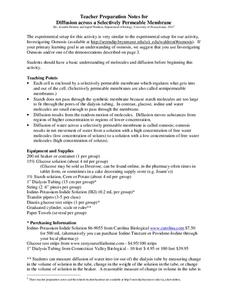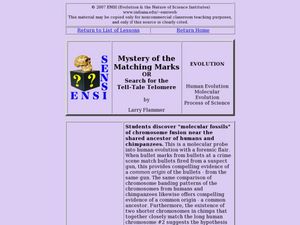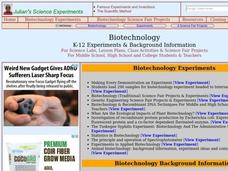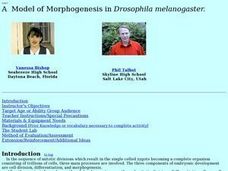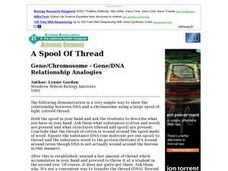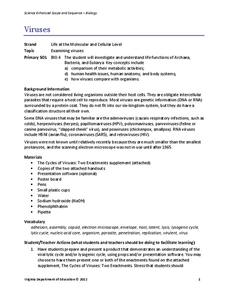Virginia Department of Education
The Ratio of Surface Area to Volume
Demonstrate the ratio of surface area to volume in your high school class by using phenolphthalein, gelatin, and an onion. Intrigue the class by leading a discussion on osmosis and diffusion, then making "scientific jello." Participants...
Virginia Department of Education
Genetic Variation and Mutations
Young scientists demonstrate their creativity while completing several activities, to assess genetic variations and mutations. Instructors provide a list of options and scientists choose to write a comic strip, create a book, construct a...
Curated OER
Diffusion Across a Selectively Permeable Membrane
Students investigate how water passes through cell membranes. In this biology lesson, students differentiate osmosis and diffusion. They illustrate the movement of water in both processes.
Curated OER
Mystery of the Matching Marks
Learners view a Power Point and complete activities related to genetic evidence of human evolution. In this molecular evolution lesson, students view and discuss a provide presentation. They search for the "tell-tale telomere" and...
Curated OER
Biotechnology
Students explore biotechnology through various activities. For this biology lesson, students analyze its pros and cons. They study and read informative articles about biotechnology.
Curated OER
Protoplast Production (Plant Cells Without Walls)
Students explore the spherical protoplasts of plants. Students observe that plant cells have a plasma membrane in addition to the cell wall. Students plasma membranes, solutes and organelles.
Curated OER
How Genes Work Lesson Plan
Students define the key terms that are the structure and function of DNA. In this genetics lesson students complete a lab activity in which they construct a model DNA structure.
Curated OER
"Who Done It?" Analysis of Molecular Fingerprints Left At the Scene of the Crime
Students examine different types of DNA fragments. They record and analyze their results. They determine who is the criminal in the story.
Curated OER
How do things flow in and out of a cell?
Students revise thier partner's essay. They also write the second draft of their essay for homework. Students use the Protein Explorer web site to visualize molecules, ATP, DNA, proteins and lipid bilayer. They are able to see all the...
Curated OER
Student Cancer Journals -- Personal Reflections and Research on Life and Death Issues
Concepts learned in the study of mitosisand biochemistry help when making life or death decisions. Compile a notebook or portfolio of work related to the project can make the research more organized and relevant.
National Center for Case Study Teaching in Science
Bad Fish, Bad Bird
In an advanced biology lesson, learners see a PowerPoint about biologist Dr. Westwood, a two-time victim of poisoning. Designed to be used with clickers in the classroom, you could modify the lesson by creating a worksheet from the...
Curated OER
Strawberry Smoothies
Biologists extract the DNA from a strawberry. After completing the procedure, learners write answers to a few questions on the lab sheet provided. This is ideal lab practice during a DNA unit in your general biology course.
Curated OER
A Model of Morphogenesis in Drosophila Melanogaster
Students investigate the following scientific terms and ideas: rates of diffusion, the role of morphogens in the development of larva, the chemical dynamics of a cell, and the significance of embryo polarity during development.
Curated OER
Sociobiology: Heredity Factors
Students examine DNA replication and how proteins are synthesized from DNA codes and continue to explore the effects of genetics in additional lessons. Among the topics covered are: protein synthesis, cell chemistry, environmental...
Curated OER
Blood Business
Students identify the different kinds of blood. In this biology lesson, students investigate the antigens, agglutinins and Rh factor using their own blood. They use Punnett squares to predict blood type of offspring.
Curated OER
The Challenge to Deliver Insulin
Students study the types of diabetes and why insulin is important. In this diabetes lesson plan students build molecular models and create a healthy lifestyle plan.
Curated OER
Using VNTR Analysis to Identify Guilt at a Crime Scene
Learners collect DNA from cheek cells. They compare and contrast the processes of DNA replication and PCR. They discuss how this information can be used to determine guilt at crime scenes.
Curated OER
Transcription, Translation, and the Genetics of Microbes
Students construct various virus models using Fruit loops and Alphabits to represent nucleotides and molecules. They constructs capsomeres using shoes as the capsomeres and discuss various viruses.
Curated OER
A Spool Of Thread
Pupils describe a spool of light colored thread that the teacher holds in his/her hands. They are asked what substances (cotton and wood) are present and what structures (thread and spool) are present. The teacher conclude that the...
Curated OER
Gene Regulation Mechanisms
Students explore genetics. They discuss how chromosomes and/or genes are regulated during the life of an organism. In a lab setting, students compare and contrast the genomic regulation of prokaryotic and eukaryotic cells using...
Curated OER
DNA and Genes
Students analyze the structure of DNA. They describe how the structure of DNA enables it to reproduce itself accurately. Students discuss genes and the sequence of nucleotides occur in DNA.
Virginia Department of Education
Viruses
Germs, parasites, and viruses, oh my! Facilitate a lesson on viruses as individuals explore functions of Archaea, Bacteria, and Eukarya. They learn how viruses compare with other organisms in nature and how they contribute to health...
Virginia Department of Education
The Effects of Heat and Acid on the Enzyme Catalase
How quickly do enzymatic reactions occur? Assist the class as they examine heat and pH change to determine the rate of chemical reactions using catalase as an enzyme. Watch them "glow" with excitement!
Virginia Department of Education
DNA Structure, Nucleic Acids, and Proteins
What is in that double helix? Explain intricate concepts with a variety of creative activities in a activity that incorporates multiple steps to cover DNA structure, nucleic acids, and proteins. Pupils explore the history of DNA...




